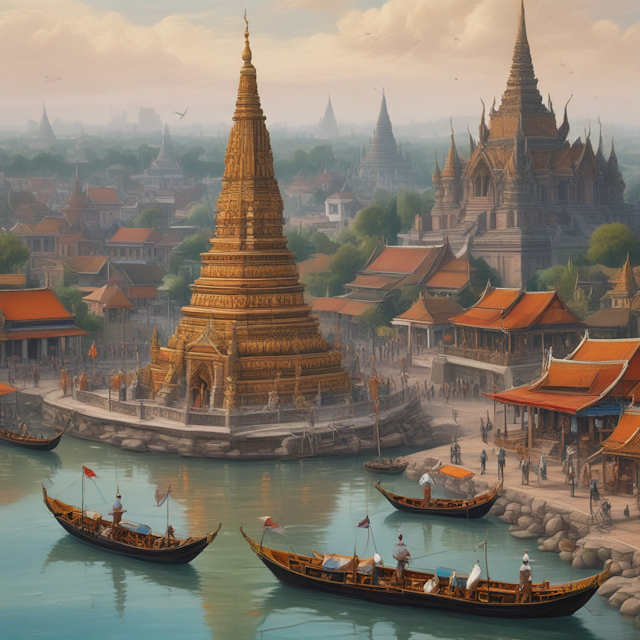
| Name | Ayutthaya Kingdom |
| Region | Southeast Asia |
| Status | Independent |
| Culture | Buddhist |
| Government | Monarchy |
| Common Name | Ayutthaya |
| Development | Technologically advanced, economically prosperous regional power |
| Unique Trait | Never colonized by Western powers, preserved traditional monarchy and cultural heritage |
| Geopolitical Role | Resisting imperialism, promoting cooperation among ethnic groups |
The Kingdom of Ayutthaya, commonly referred to as simply Ayutthaya, is a Southeast Asian nation located on the Indochinese Peninsula. Unlike its counterpart Siam/Thailand in the primary timeline, Ayutthaya has maintained its independence and distinct cultural identity throughout the modern era. As the successor to the medieval Ayutthaya Kingdom, the modern Ayutthaya is a prosperous, technologically advanced nation known for its rich Buddhist heritage and influential role in regional affairs.
The origins of the Ayutthaya Kingdom can be traced back to the 14th century, when the city of Ayutthaya was founded along the Chao Phraya River. Over the following centuries, Ayutthaya emerged as the dominant power in the region, establishing control over much of mainland Southeast Asia including modern-day Laos, Cambodia, and parts of Malaysia.
The kingdom reached the peak of its power and influence in the 17th century, establishing diplomatic and commercial ties with various European powers, including the Dutch East India Company and the Iberian Union. However, unlike its neighbors, Ayutthaya successfully resisted colonization, maintaining its independence and sovereignty throughout the 19th and 20th centuries as the region was carved up by European imperialism.
The fact that Ayutthaya never succumbed to European colonization had a profound impact on its subsequent development. Without the disruptions and exploitation associated with colonial rule, the kingdom was able to chart its own course, preserving its traditional Buddhist monarchy and social structures.
This allowed Ayutthaya to focus on modernizing and strengthening its economy and military during the 20th century, emerging as a major regional power. The kingdom invested heavily in education, infrastructure, and high-tech industries, developing a diversified, knowledge-based economy. Ayutthaya's military also grew into one of the most capable in Southeast Asia, allowing it to deter foreign intervention.
At the heart of Ayutthaya's national identity is its deep-rooted Buddhist tradition. The kingdom's rulers have long been seen as divinely ordained protectors of the Theravada Buddhist faith, and the monarch continues to play a central role in religious and cultural life.
Ayutthaya's Buddhist monasteries and temples remain important centers of learning and spiritual practice. The kingdom's architecture, arts, and literature are also heavily influenced by Buddhist themes and iconography. This religious and cultural continuity has imbued Ayutthaya with a strong sense of national identity and purpose that has endured through the centuries.
While maintaining its traditional identity, Ayutthaya has also transformed into a technologically advanced, economically prosperous nation. Key industries include aerospace, electronics, automotive, and renewable energy - sectors in which Ayutthaya has become a global leader. The kingdom has also developed a thriving service economy centered around finance, information technology, and tourism.
This economic success has been underpinned by major investments in education, research and development, and infrastructure. Ayutthaya is home to several world-class universities and research institutes that have produced groundbreaking innovations. The kingdom's advanced transportation network, including a state-of-the-art high-speed rail system, also facilitates domestic and international commerce.
Ayutthaya's independence and growing power have allowed it to play a pivotal role in regional affairs. The kingdom has emerged as a bulwark against outside interference, using its economic and military might to resist Western imperialism and promote cooperation among the diverse nations of Southeast Asia.
Ayutthaya maintains close ties with its neighbors, engaging in robust trade, cultural exchange, and security cooperation. The kingdom has also taken a leading role in regional organizations like the Association of Southeast Asian Nations (ASEAN), using its influence to advocate for the interests of smaller states. Ayutthaya's unique position as an independent, technologically advanced Buddhist kingdom has made it an influential voice on the global stage.
Ayutthaya is home to a diverse population of over 70 million people. In addition to the ethnic Thai majority, the kingdom has sizable minorities of Lao, Khmer, Malay, Chinese, and other ethnic groups. This diversity is celebrated and protected under Ayutthaya's constitutional monarchy, which enshrines the rights of all citizens regardless of their background.
The kingdom's pluralistic identity is reflected in its vibrant arts, cuisine, and architecture. Ayutthaya is known for its rich tapestry of cultural influences, drawing on the traditions of its neighbors while maintaining a distinct national character rooted in Buddhism. This ethos of unity in diversity has been crucial to the kingdom's stability and prosperity.